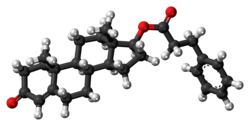 | |
 | |
| Clinical data | |
|---|---|
| Trade names | Testolent, Sustanon 100, Sustanon 250, Omnadren 250 |
| Other names | TPP; Testosterone phenpropionate; Testosterone hydrocinnamate |
| Routes of administration | Intramuscular injection |
| Identifiers | |
| |
| CAS Number | |
| PubChem CID | |
| DrugBank | |
| ChemSpider | |
| UNII | |
| KEGG | |
| ChEMBL | |
| CompTox Dashboard (EPA) | |
| ECHA InfoCard | 100.013.650 |
| Chemical and physical data | |
| Formula | C28H36O3 |
| Molar mass | 420.593 g·mol−1 |
| 3D model (JSmol) | |
| |
| |
Testosterone phenylpropionate (BAN; TPP) (brand name Testolent), or testosterone phenpropionate, also known as testosterone hydrocinnamate, is a synthetic anabolic-androgenic steroid (AAS) and an androgen ester – specifically, the C17β phenylpropionate ester of testosterone – which was formerly marketed in Romania.[1][2][3][4] It was first synthesized in 1951 and was first described in the literature by 1953.[5] The medication was an ingredient of several isolated AAS commercial products, but was never widely used.[4] Testosterone phenylpropionate was also notably a component of Sustanon and Omnadren, as well as of Estandron Prolongatum, Lynandron Prolongatum, and Mixogen.[4][6] TPP was previously available in Great Britain.[7]
| Medication | Form | Major brand names | Duration |
|---|---|---|---|
| Testosterone | Aqueous suspension | Andronaq, Sterotate, Virosterone | 2–3 days |
| Testosterone propionate | Oil solution | Androteston, Perandren, Testoviron | 3–4 days |
| Testosterone phenylpropionate | Oil solution | Testolent | 8 days |
| Testosterone isobutyrate | Aqueous suspension | Agovirin Depot, Perandren M | 14 days |
| Mixed testosterone estersa | Oil solution | Triolandren | 10–20 days |
| Mixed testosterone estersb | Oil solution | Testosid Depot | 14–20 days |
| Testosterone enanthate | Oil solution | Delatestryl | 14–28 days |
| Testosterone cypionate | Oil solution | Depovirin | 14–28 days |
| Mixed testosterone estersc | Oil solution | Sustanon 250 | 28 days |
| Testosterone undecanoate | Oil solution | Aveed, Nebido | 100 days |
| Testosterone buciclated | Aqueous suspension | 20 Aet-1, CDB-1781e | 90–120 days |
| Nandrolone phenylpropionate | Oil solution | Durabolin | 10 days |
| Nandrolone decanoate | Oil solution | Deca Durabolin | 21–28 days |
| Methandriol | Aqueous suspension | Notandron, Protandren | 8 days |
| Methandriol bisenanthoyl acetate | Oil solution | Notandron Depot | 16 days |
| Metenolone acetate | Oil solution | Primobolan | 3 days |
| Metenolone enanthate | Oil solution | Primobolan Depot | 14 days |
| Note: All are via i.m. injection. Footnotes: a = TP, TV, and TUe. b = TP and TKL. c = TP, TPP, TiCa, and TD. d = Studied but never marketed. e = Developmental code names. Sources: See template. | |||
- ^ Elks J (14 November 2014). The Dictionary of Drugs: Chemical Data: Chemical Data, Structures and Bibliographies. Springer. pp. 641–642. ISBN 978-1-4757-2085-3.
- ^ Index Nominum 2000: International Drug Directory. Taylor & Francis. January 2000. ISBN 978-3-88763-075-1.
- ^ Morton IK, Hall JM (6 December 2012). Concise Dictionary of Pharmacological Agents: Properties and Synonyms. Springer Science & Business Media. ISBN 978-94-011-4439-1.
- ^ a b c Llewellyn W (2011). Anabolics. Molecular Nutrition Llc. pp. 583, 697. ISBN 978-0-9828280-1-4.
- ^ Dekansi J, Chapman RN (September 1953). "Testosterone phenyl propionate (TPP): biological trials with a new androgen". Br J Pharmacol Chemother. 8 (3): 271–7. doi:10.1111/j.1476-5381.1953.tb00793.x. PMC 1509286. PMID 13093945.
- ^ Becker KL (2001). "Clinical Use and Abuse of Androgens and Antiandrogens". In Matsumoto AM (ed.). Principles and Practice of Endocrinology and Metabolism. Lippincott Williams & Wilkins. pp. 1185–. ISBN 978-0-7817-1750-2.
- ^ Bishop PM (1958). "Endocrine Treatment of Gynaecological Disorders". In Gardiner-Hill H (ed.). Modern Trends in Endocrinology. Vol. 1. London: Butterworth & Co. pp. 231–244.